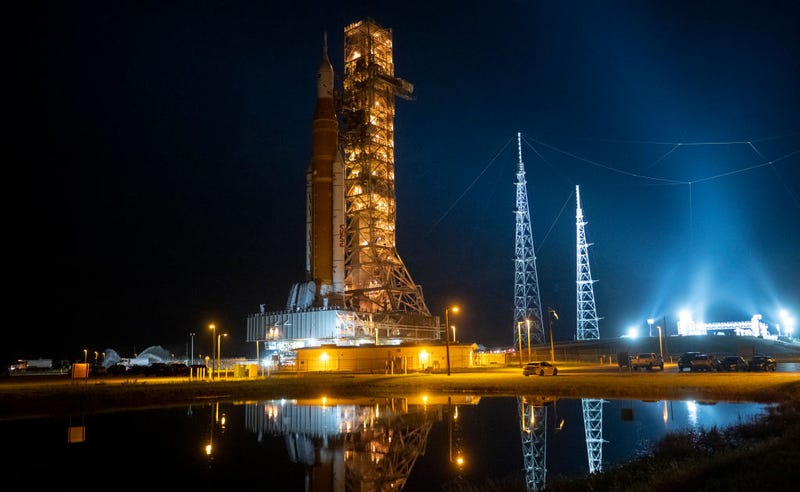
After several attempted launches, including one planned Tuesday, the Artemis I rocket that will kick off a new phase of lunar exploration has been delayed again, partially due to Hurricane Ian.
NASA personnel said that the rocket is now expected to launch in mid-November. It was previously expected to launch Aug. 29.
This hurricane reached a Category 4 as it made landfall in southeastern Florida Wednesday. It was downgraded to a tropical storm before winding back up to a hurricane and making landfall again in South Carolina as a Category 1.
NASA announced this week that “as Hurricane Ian moves toward Florida, the agency began to roll back its rocket and spacecraft at 11 p.m. Monday, Sept. 26, providing enough time for employees to prioritize safety of their families, as well as protect the Artemis I hardware before the hurricane makes landfall.”
According to a Thursday update from the Kennedy Space Center, where the Artemis I rocket is located, the visitor center would be closed Friday due to the storm.
“As our neighbors and crewmembers throughout the state continue to assess damage caused by Hurricane Ian, we are keeping everyone in our thoughts,” said the update.
In addition to the storm, NASA said Sept. 27 that a fire alarm had been triggered at around 11:45 a.m. in the Vehicle Assembly Building where the Artemis rocket was being housed.
“The Artemis I vehicle and mobile launcher entered High Bay 3 earlier this morning after rolling back from Launch Complex 39B in advance of Hurricane Ian, which is expected to bring sustained tropical storm force winds to Kennedy as early as Wednesday evening,” the agency said.
NASA explained that “an arc flash event occurred at a connector on an electrical panel in the bay and that a “spark landed on a rope marking the boundary of the work area.”
This rope then began to smolder and workers pulled the alarm.
Employees evacuated the building safely and no injuries were reported.
Kennedy Center director Janet Petro said that the fire was a “good distance” from the rocket vehicle itself and that the equipment was not at risk. She also said Tuesday that the cause was under investigation.
“The incident occurred on the third floor of F-tower at the Mobile Launcher power connection,” said NASA. “Technicians shut down power to the panel, and the center’s emergency responders declared the VAB safe for employees to return to work.”
According to a Thursday update from NASA, part of the agency’s “hurricane preparedness protocol,” includes a “ride out” team that is to remain in a safe location at Kennedy throughout the storm to monitor center-wide conditions. When the storm passes, the team is expected to assess facilities, property, and equipment. Once the facility is deemed safe, platforms should be extended to establish access to the rocket and spacecraft.
In recent weeks, leaks and other issues have pushed the rocket launch back.
During a Tuesday teleconference, Jim Free – associate administrator, Exploration Systems Development Mission Directorate, NASA Headquarters – said that personnel are not concerned that the Artemis I rocket was outside for a number of weeks before the hurricane.
He also confirmed that the rocket will likely launch in November, though late October has also been suggested.
“Our preference is to launch in the daylight,” due to better visuals, he added. “We won’t rule out the nighttime launch either.”
LISTEN on the Audacy App
Sign up and follow Audacy
Facebook | Twitter | Instagram

